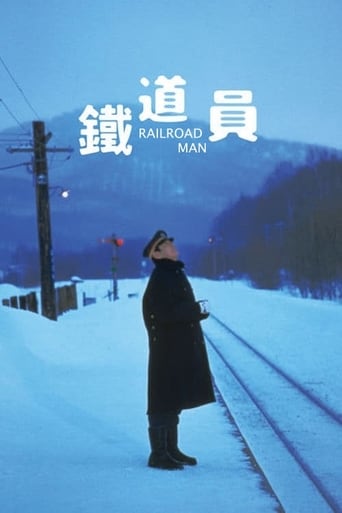saylesp-1
For many people this will be an emotional movie. I was one of them. It is a story of duty taking precedence over family. Unfortunately I know the situation intimately due to conflicts between military service and family. Like the station master I chose duty at the expense of family. The story of what his daughter would have been like is told over several episodes. First as a grade schooler, then a teenager and finally as a young adult. I found myself thinking the same thing - how would my child have developed. It was profoundly moving. You also see the respect that others had for the station master. It came from young railway men and fellow towns people old alike. The concluding scenes were as moving as any of the others in the film.For train buffs, the steam engines are excellent and even the 1 car diesels are good. In my part of Japan the diesels are quite common.Hokkaido is a place where towns are dying and railways are disappearing as the movie alludes to. I am writing this in a hotel lobby in Sapporo, Hokkaido, in weather similar to the movie. It has an added touch of reality.I recommend this film to all who have an interest in Japan and life in the far north.
Jey-and-Mina
We made the mistake of not having any tissues next to us while watching this. This movie does a brilliant job of portraying the life of a railroad worker who is so dedicated to his job, that the greatest joys of his life pass him by and he only realizes it when it is too late.It helps if the viewer has an appreciation of Japanese culture and the importance of dedication to one's company (especially among the older generation) to really feel the impact of this movie. If you do not view this film from that perspective, then you will have difficulty empathizing with the main character and therefore miss the beauty contained therein.
Brilliant, beautiful, and poignant. 10/10
yukino_yoshi
A real touching film based on an equally moving short story. So much that it actually hurts. I just couldn't hold my tears back towards the end of the film, and I doubt those who appreciate this wonderful movie can either. Yes, it's a tear-jerker, but unlike love stories (and this isn't one) it's the poignance behind one man's stoicism -- that of a man who's not just about to be brush aside by progress, but also tormented by his guilt over the death of his wife and daughter -- that makes it heart-warming yet sad at the same time. Kudos to Yasuo Furuhata for staying faithful to Jiro Asada's story, and Ken Takakura for a stirring performance as the aging station manager.This film will probably haunt me again the next time I take a train-ride through the snow.
Kahuna-6
Must had cried for a thousand miles. Watching a movie on a 6" screen trapped in a coach seat at 30,000 ft high is usually a diversion not a pleasurable entertainment. But strangely enough, this simple 3 hankie movie is both engaging and moving.A railway man works at the end of a desolated railway line, at the end of his career, at the end of his life. Nothing much happens. He does his job at the one man station faithfully. He greets the old familiar commuters with the station name, shovels snow off the platform, sends the train off with a ritualistic check list. He did this almost all his life with the same mechanical precision. He had a family once. His daughter died at a very young age and more recently his wife died.The lonely widower had a few visitors on New Year Eve. And the news were not feastive. The little town, with the younger population migrating to bigger places, would probably die of old age. The rail line, facing declining traffic and increasing loss, will be closed. And he would have to vacate the station which was also his home for most of his life.The director, Yasuo Furuhata, handles the story with sensitivity and humility. The occasional high camera or wide angle shots only accentuates the isolation. Cutting is excellent. Scenes are allowed to sustain poignancy without allowing distraction. Quick cuts are used to enforce the ritual routine with precision. The bare story line & minimal dialogue was not a handicap. The use of flashbacks in fact creates beautiful characterisation without unnecessary ornamentation. The old method of using colour tone to delineate time events was very effective here. In one particular scene shot from a static camera position flowed with a continuous action shifted over time just by the use of colour. Seamless, masterly.How did veteran lead Ken Takakura win so much empathy for his part is really a mystery. No strut, quiet body and very little facial expression. Yet he involves us in the internal conflicts of the character. When he said "no regrets" over the choices he had made in his career, the price he had to pay and the sadness he felt is palpable.Don't believe a word I say. Just go watch the movie.


